|
|
本帖最后由 I'm_zhcn 于 2009-3-28 01:50 编辑
Tibet serf debate shadows China's "emancipation day"
http://news.yahoo.com/s/nm/20090327/wl_nm/us_china_tibet_serfs
By Emma Graham-Harrison – Fri Mar 27, 4:24 am ET
KHESUM, China (Reuters) – Lots of salty yak butter tea and an end to harsh beatings marked the start of the 1960s for farmer Kigya, who grew up shackled to the estate of a local nobleman by the inherited ties that once bound most Tibetans.
That world vanished overnight when Chinese troops flooded the Himalayan plateau in 1959 to quell an uprising, took direct control of government in Lhasa and rolled out radical changes.
China's Communist leaders say they abolished a feudal, theocratic system that would have been familiar to the peasants of mediaeval Europe. This Saturday they will launch an annual "Serf Emancipation Day" public holiday in Tibet to mark the dissolution of the serf system.
But critics say China has exaggerated the cruelty of traditional Tibetan life to disguise a power grab, swept away much that was good along with the bad, and destroyed an indigenous government that was attempting more sensitive reforms.
By commemorating its "emancipation" of Tibetans, China may enrage many already angry and frustrated Tibetans, who do not feel they enjoy true freedom under Chinese rule, analysts said. This may spark unrest at a volatile time, they added.
"It will be very provocative," said Tsering Shakya, a Tibet expert and research chair at the University of British Columbia. "People will be cowed into celebrating this holiday so this is a time when there may be more tension than early March."
This month Tibetans have marked the 50th anniversary of the flight into exile of the Dalai Lama, their still widely revered spiritual leader, and one year since deadly riots shook Lhasa and triggered waves of protests in ethnic Tibetan areas.
A huge security presence has kept the restive region largely calm, but there have been sporadic protests; a monk set himself on fire and a bomb was lobbed at an unfinished police station. Experts and activists say the unrest is likely to
continue.
SERFS OR NOT?
Even the name of the new holiday is controversial. Opponents say "serfdom" is too loaded to describe the Tibetan system, while China denounces its critics as apologists for a cruel regime.
"The serfs and slaves, making up over 95 percent of the total population, suffered destitution, cruel oppression and exploitation and possessed no means of production or personal freedom whatsoever," a recent government white paper declared.
Few serious scholars contest that most Tibetans were bound by birth to estates held by nobles, monasteries or officials.
"The key characteristic of the system was that individuals did not have the right to opt out. They could not give back their land to the estate and live as free peasants," said Melvyn Goldstein, at Ohio University's Center for Research on Tibet.
But many foreign academics and exiled Tibetans also say Beijing has rewritten history, oversimplifying and distorting a complex system, in part by using transplanted concepts.
"The Chinese trick is to say the words 'serf' and 'feudal' and make us think brutal," said Robbie Barnett, director of the Modern Tibetan Studies Program at Columbia University.
Obligation to provide labor fell on families or households, not individuals, so while some worked for the estate, others were away trading or in the family's own fields, academics say.
Peasants who ran away often were not brought back, and although trading of serfs happened, it was not widespread. Others rented their freedom on a yearly basis with a "human lease."
Some "serfs" were also wealthy landowners in their own right, with serf-servants of their own, making a more complex social picture than is reflected in Beijing's official line.
Managers could be brutal, and whips were still used in 1959.
"The owners always wanted more and one way of getting more is doing hard physical punishment and setting an example for the others, and that was common," said Dawa Tsering, from the Tibet Academy of Social Sciences in Lhasa, who studied under Goldstein.
"The extreme was that they may beat you to death." But many Chinese accounts of cruelty mix details of extreme and disused punishments from centuries-old legal codes with actual practice in the 1950s, like a recent exhibition in Beijing where an "eye-gouging stone" was placed next to whips.
The last official blinding was in 1934, of a nobleman convicted of treason. By then, no living member of the caste who performed mutilations had ever done it, or even seen it carried out, Goldstein recounted in his "History of Modern China."
They had to rely on stories of the technique passed down from their parents and bungled the operation horribly, he wrote.
DISCONTENTED DESCENDANTS
If the nature of Tibet's traditional social system is disputed, the destitution of many living on the high, harsh plateau is not.
The modest way in which Kigya, who like many Tibetans only uses one name, marked improvements in his life after reforms are testament to that.
"It was not great but it was better. We could eat rice and noodles and salty butter tea, which we did not have before," he told journalists visiting his village of Khesum on a government sponsored trip. Previously he ate largely roasted barley.
In a village where women still wash clothes in a trench and farm animals wander down the main alley, there is a forest of TV aerials and time to rehearse for a local dance showdown.
The vast majority of Tibetans in the region today are the descendants of serfs, and life has improved materially for many.
But resentment appears to have risen in tandem with living standards, and China has unveiled the new holiday at a time of mourning for the dead of last year and widespread discontent.
"This holiday is just another 'made in China' product," said one radical Tibetan, in a scathing reference to the string of tainted and fake food and other goods that have streamed out of Chinese factories in recent years, denting its reputation.
The protests, riots and harsh security response this time last year appear to be a direct affront to China's argument that it has brought progress to a backward region.
Beijing says the unrest stems from economic tensions in a still-developing region, and meddling by hostile Western powers in alliance with the Dalai Lama, whom it brands a separatist.
"The West is playing the Tibet card to create problems for China," said Zhang Yun, at the China Tibetology Research Center.
But juxtaposed with the new holiday, the signs of widespread discontent raise an awkward question for China.
"These are the second or third generation who are supposed to be the sons and daughters of liberated serfs, so why are they rising up?" said the University of British Columbia's Shakya.
Additional reporting by Yu Le; Editing by Megan Goldin
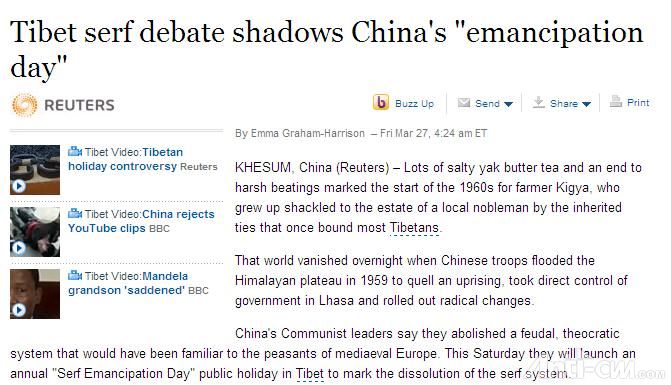
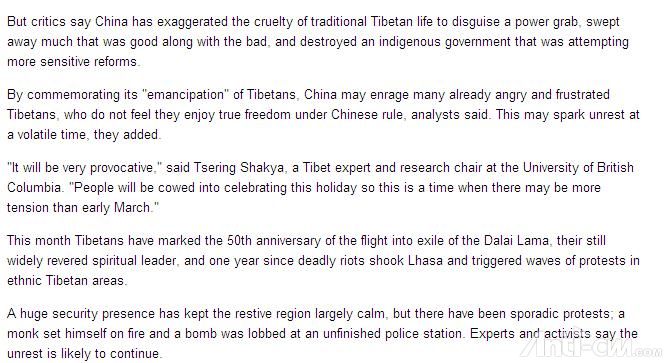
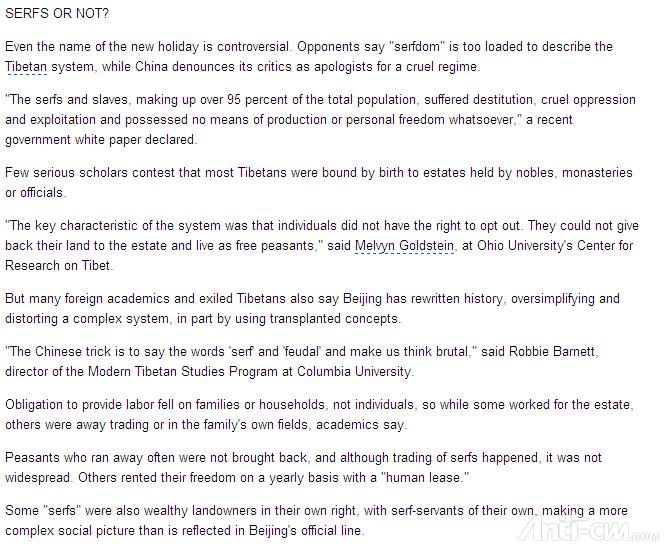
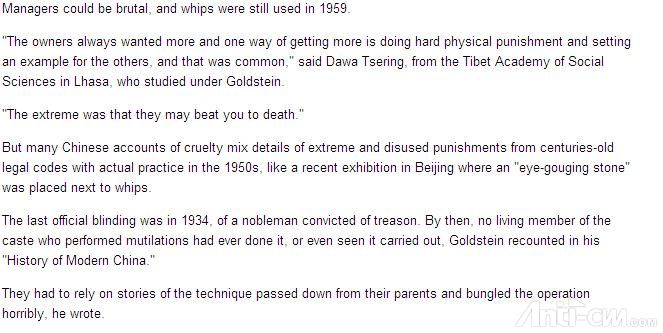
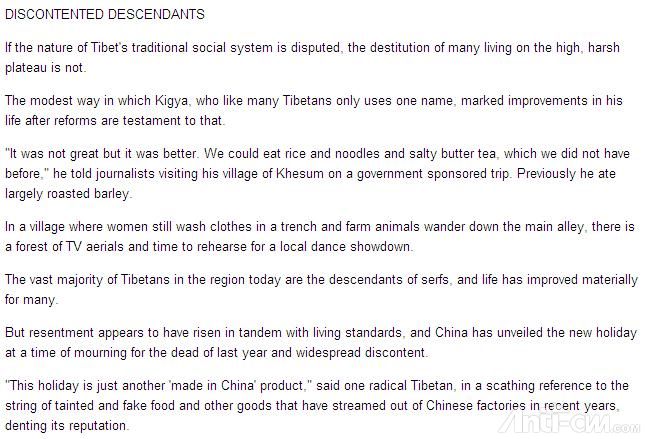
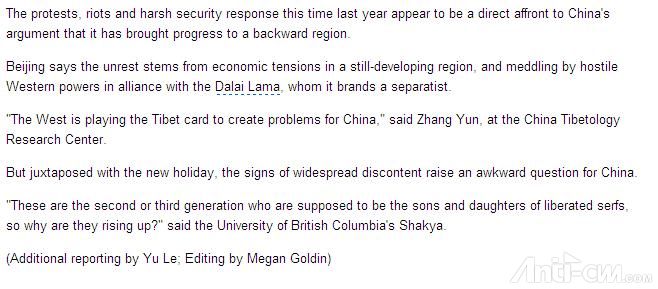
|
Debate, emancipation, reuters, shadows, Tibet, Debate, emancipation, reuters, shadows, Tibet, Debate, emancipation, reuters, shadows, Tibet
评分
-
1
查看全部评分
-
|